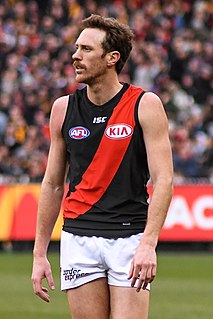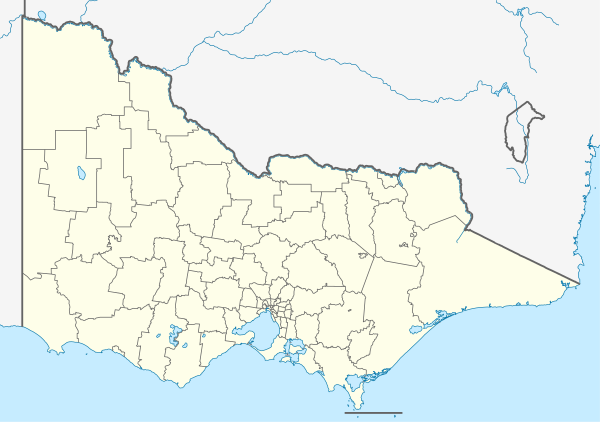
The Victorian Football League (VFL) is the major state-level Australian rules football league in Victoria and, starting from 2021, New South Wales and Queensland. The league evolved from the former Victorian Football Association (VFA), and has been known by its current name since 1996. For historical purposes, the present VFL is sometimes referred to as the VFA/VFL, to distinguish it from the present day Australian Football League, which was known until 1990 as the Victorian Football League and is sometimes referred to as the VFL/AFL.

In the Australian state of Victoria, the sport of Australian rules football is the most popular football code. The game's popularity in Victoria stems from its origins in Melbourne in the 1850s, with the first club and the first league both based in the city. Ten of the eighteen teams participating in the Australian Football League (AFL) are based in Victoria, as a result of the league's origins as the Victorian Football League (VFL). The Melbourne Cricket Ground, with a capacity of 100,024 people, is considered the "spiritual home" of the game, and hosts the sport's largest event, the AFL Grand Final, yearly.
The Morrish Medal is an Australian rules football award.
The NSW/ACT Rams is an under 18 Australian rules football representative club in the TAC Cup.
The 2007 Victorian Football League (VFL) is a semi-professional Australian Rules Football competition featuring twelve teams from Victoria and one team from Tasmania.
Oakleigh Football Club, nicknamed the Devils, was an Australian rules football club from Oakleigh which played in the VFA from 1929 until 1994. Oakleigh wore purple guernseys with a gold monogram thus giving them their original nickname the Purple and Golds.
Dandenong Football Club was an Australian rules football club which played in the Victorian Football Association (VFA). Based in the Melbourne suburb of Dandenong, the Redlegs wore navy blue and red as their club colours.

Mitchell Brown is an Australian rules footballer for the Melbourne Football Club in the Australian Football League (AFL), having previously played for Geelong between 2009 and 2014 and Essendon between 2016 and 2019.
The 2009 Victorian Football League (VFL) season was the 128th season of the Australian Rules Football competition. The premiership was won by the North Ballarat Football Club, which defeated the Northern Bullants by 23 points in the Grand Final on 25 September. It was North Ballarat's second consecutive premiership, and the second in the club's history.
Paul McCormack is a former Australian rules footballer who played with Carlton in the Australian Football League (AFL) and Norwood Football Club in the South Australian National Football League (SANFL).
James Magner is an Australian rules football player who formerly played professionally at the Melbourne Football Club in the Australian Football League (AFL).
The 2001 National AFL Under 18 Championships was the sixth edition of the AFL Under 18 Championships. Eight teams competed in the championships: Vic Metro, Vic Country, South Australia and Western Australia in Division 1, and New South Wales/Australian Capital Territory (NSW/ACT), Northern Territory, Queensland and Tasmania in Division 2. The competition was played over three rounds across two divisions. Vic Metro and Tasmania were the Division 1 and Division 2 champions, respectively. The Michael Larke Medal was awarded jointly to Sam Power and Steven Armstrong, while the Hunter Harrison Medal was won by Tasmania's Tom Davidson.
The 1995 Victorian Football Association season was the 114th overall season of the Australian rules football competition. The premiership was won by the Springvale Football Club, after it defeated Sandringham in the Grand Final on 24 September by 43 points; it was the second premiership won by the club.
The 1998 Victorian Football League season was the 117th season of the Australian rules football competition. The premiership was won by the Springvale Football Club, after it defeated Werribee by 38 points in the Grand Final on 20 September. It was Springvale's fourth top division premiership, and the third of four premierships it won in the five years from 1995 to 1999.
The 2000 Victorian Football League season was the 119th season of the Australian rules football competition. The premiership was won by the Sandringham Football Club, after defeating North Ballarat by 31 points in the Grand Final on 27 August.

Charlie Spargo is a professional Australian rules footballer playing for the Melbourne Football Club in the Australian Football League (AFL). A small forward, 1.73 metres tall and weighing 71 kilograms (157 lb), Spargo plays primarily as a forward, but also has the ability to play in the midfield. He has strong family connections in Australian football, whereby he is a fourth generation VFL/AFL player, with his great-grandfather, grandfather, great uncle and father all playing in the VFL/AFL.

Jordyn Allen is an Australian rules footballer playing for the Collingwood Football Club in the AFL Women's competition (AFLW).

The NAB League Girls is an under-17 Australian rules football representative competition held in Australia. It is based on geographic regions throughout country Victoria and metropolitan Melbourne with each team representing twelve Victorian regions, while a thirteenth team from Tasmania was introduced in 2019. The competition is sponsored by National Australia Bank (NAB), having previously been sponsored by the Transport Accident Commission (TAC) since its inception.
The 1993 TAC Cup season was the 2nd season of the NAB League competition.
Toby Bedford is an Australian rules footballer playing for Melbourne in the Australian Football League (AFL). A small forward, he made his AFL debut in the opening round of the 2020 season.









